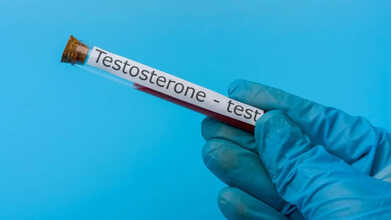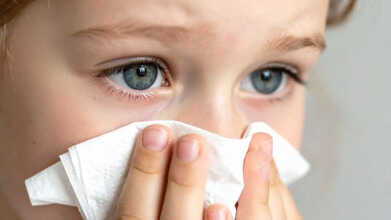- Health Conditions A-Z
- Health & Wellness
- Nutrition
- Fitness
- Health News
- Ayurveda
- Videos
- Medicine A-Z
- Parenting
The Man Who Brought HIV Testing In Mainstream Died Of A Cardiovascular Disease

Credits: Canva
Last month, the 63-year-old champion of HIV Testing passed away of hypertensive atherosclerotic cardiovascular disease. This is A Cornelius Baker. Born on September 30, 1961, in Sodus, a village in upstate New York, he spent 40 years of his life working to make HIV testing accessible to all and working towards its awareness. On November 8, he passed away in his home in Washington.
Who Was Baker?
He was a gay, who tested positive for HIV, writes The New York Times. He became active in Washington in the 1980s, which was also the early years of the AIDS epidemic. He became the voice for people with HIV and AIDS. He held positions in federal government, and nonprofits and served as head of a clinic for the LGBTQ community.
In 1995, as the executive director of the National Association of People with AIDS, he also established June 27 as the National HIV Testing Day, promoting HIV testing to the mainstream. It also reduced the stigma of HIV testing and normalized it as a component of regular health screening.
He was also the adviser to the National Black Gay Men's Advocacy Coalition from 2006 to 2015. There, he worked with the Centers for Disease Control and Prevention (CDC) and the National Institutes of Health to help fund research for the care of gay Black men with HIV and AIDS.
The Tuskegee Study
The Tuskegee Study of Untreated Syphilis was conducted between 1932 and 1972 and observed the natural history of the disease, writes CDC. The state had promised 600 African American men in Alabama free medical care in return for studying the progression of the disease.
However, on the contrary, the men were only given placebos such as aspirin and mineral supplements, despite knowing that penicillin must be used for its treatment. This was known to the world already in 1947. As a result, many of the men died, went blind or insane or experienced other severe health problems due to their untreated syphilis. This distrust of the Tuskegee study impeded efforts to fight AIDS in Black neighborhoods.
ALSO READ: These 10 US States Have The Highest STI Cases
In 1997, Baker told The New York Times that Black people would not take AIDS medicine because they feared that they would be "killed off as part of the master plan". He also lobbied for President Bill Clinton to apologize for the federal government's involvement, eventually, he did, and said, "What the United States did was shameful, and I am sorry."
What was the condition that led to his demise?
He was suffering from hypertensive atherosclerotic cardiovascular disease. This is a condition that involves plaque buildup in the artery walls. This can lead to issues like coronary heart disease, heart attack, angina, and coronary artery stenosis.
It also reduces blood flow to the heart muscle, which then causes chest pain. It could also lead to excessive thickening of the heart muscle, heart failure or stroke. This is what Baker lost his life to, however, his efforts to combat misinformation and fear-mongering about HIV and AIDS will be remembered and work as a stepping stone for many more developments in health care, especially towards sexual health to come.
Can Increasing Testosterone Help You Conceive? Doctors Explain

Credits: Canva
For many men trying to conceive, testosterone sounds like an obvious answer. It is often linked with strength, vitality, and male health, so the assumption is that higher levels must also support fertility. In reality, the opposite is often true. Medical experts caution that using testosterone, especially without supervision, can interfere with sperm production and quietly lower the chances of becoming a father.
To know more about the same, we got in touch with Dr. Ambavarapu Divya Reddy, Fertility Specialist, Nova IVF Fertility, LB Nagar, Hyderabad.
Can Increasing Testosterone Help You Conceive?
Dr. Ambavarapu Divya Reddy said, the short answer is no. Testosterone is a male sex hormone, but it does not support fertility in the way many people assume. In fact, taking testosterone can work directly against sperm production. For men who want children, using testosterone without expert guidance can quietly reduce fertility rather than improve it. Here is what doctors want patients to understand.
Why Testosterone Does Not Boost Fertility?
Testosterone is fundamentally opposed to male fertility when taken from outside the body. Using testosterone injections, gels, patches, or pellets suppresses the natural communication between the brain and the testicles that keeps sperm production going. Dr Reddy said, “When this system is switched off, sperm counts fall and in some cases drop to zero. Fertility declines instead of improving.”
This is why men who plan to have children should never begin testosterone therapy without speaking to a specialist.
How Does Sperm Production Work?
Sperm are produced in the testicles with the help of testosterone that is made inside the testicles themselves. This internal testosterone is tightly controlled by the brain through a hormone called luteinizing hormone, or LH.
Dr Reddy told us, when external testosterone is introduced into the body, the brain senses enough hormone is present and stops releasing LH. As a result, the testicles reduce their own testosterone production and sperm production slows or stops altogether.
In real-world practice, many men on testosterone therapy develop extremely low sperm counts or complete absence of sperm, known as azoospermia, often without any obvious symptoms. This is a well-recognised cause of male infertility and one that is largely preventable.
Low Testosterone And Fertility: What Doctors Do Instead
If a man truly has hypogonadism, meaning he has symptoms along with low testosterone levels on blood tests, treatment is still possible but must be handled carefully. Current guidelines from the AUA, ASRM, and endocrine societies strongly advise against starting standard testosterone replacement in men who want children in the near future.
Instead, specialists use treatments that can raise testosterone levels while allowing sperm production to continue. These include clomiphene, human chorionic gonadotropin or hCG, and other targeted therapies that stimulate the testicles rather than shutting them down. Updated guidance for 2024 and 2025 stresses identifying the cause of low testosterone and choosing options that protect fertility.
If you think you have low testosterone but want children
a) Do not self-prescribe testosterone.
b) Consult a reproductive urologist or endocrinologist.
c) Ask about fertility-preserving treatments such as clomiphene or hCG and consider sperm banking if timing matters.
d) If you have already used testosterone, request a semen analysis and hormone tests. Acting early can help guide recovery or fertility treatment.
Testosterone may seem like an easy solution, but external testosterone is a common and avoidable cause of male infertility. If having children is important to you, proper testing and specialist care matter. The treatment that relieves symptoms is not always the one that protects your ability to become a father.
Adenovirus: Is The Mystery Illness That’s Spreading Highly Contagious?

Credits: Canva
A little-known virus is spreading steadily across different parts of the world, prompting growing concern among health experts. Often described as “untreatable” because there is no targeted antiviral medicine available, adenovirus is drawing attention due to how tough it is and how quickly it can pass from person to person.
Eric Sachinwalla, medical director of infection prevention and control at Jefferson Health, has cautioned that while most healthy individuals develop only mild illness, people in high-risk groups may face more serious health problems. This raises an important question: just how contagious is this mystery illness that is spreading?
Adenovirus: How Contagious Is It?
Yes, adenovirus is highly contagious and spreads with ease in several ways. It can pass through respiratory droplets released during coughing or sneezing, close physical contact such as hugging or shaking hands, and contact with contaminated surfaces like toys and towels.
It can also spread through fecal matter, particularly during diaper changes, and in some cases through water. According to the CDC, the virus spreads quickly in crowded settings such as schools and daycare centres and can survive for long periods on surfaces, making good hygiene especially important for young children and people with weakened immune systems.
Who Do Adenoviruses Affect Most?
Adenoviruses can infect people of all age groups, but they are most commonly seen in children under the age of five. In babies and young children, the virus often spreads in daycare environments where close contact is common. Children are also more likely to put shared objects in their mouths and may not wash their hands as regularly.
Among adults, adenoviruses tend to spread in crowded living conditions. People staying in dormitories or military housing may have a higher risk of infection. The virus is also known to circulate in hospitals and nursing homes, as per CDC.
Those with weakened immune systems are more likely to become seriously ill from an adenovirus infection. This includes people who have undergone organ or stem cell transplants, as well as those living with cancer or HIV/AIDS. Individuals with existing heart or lung conditions may also face a higher risk of severe illness.
Adenovirus: What Are The Symptoms Of An Adenovirus Infection?
The symptoms of an adenovirus infection depend on the part of the body affected. Most commonly, the virus targets the respiratory system. When it infects the airways, it can cause symptoms similar to a cold or the flu. These may include:
- Cough.
- Fever.
- Runny nose.
- Sore throat (pharyngitis).
- Pink eye (conjunctivitis).
- Ear infection (otitis media).
- Swollen lymph nodes.
- Chest cold (bronchitis).
- Pneumonia.
Adenoviruses can also infect the digestive system. When this happens, diarrhea may occur, along with gastroenteritis. Gastroenteritis is inflammation of the stomach or intestines and can lead to stomach pain, diarrhea, nausea, and vomiting.
In rarer cases, adenoviruses can affect the bladder or the nervous system. Infection of the bladder may result in urinary tract infections. When the nervous system is involved, it can lead to serious conditions affecting the brain, including encephalitis and meningitis.
Flu Incubation Period: How Long Does It Take For Symptoms To Appear?

Credits: Canva
Influenza, commonly called the flu, is a respiratory infection caused by the influenza virus. It is contagious, which means it passes easily from one person to another. Although influenza viruses can circulate throughout the year, infections are seen more often during the fall and winter months. This time is known as the flu season. As flu cases are rising across many parts of the US and UK, here are a few key points to understand, from the incubation period to how easily the virus spreads.
What Is The Flu (influenza)?
The flu is an infection caused by the influenza virus. It usually leads to symptoms such as body and head aches, sore throat, fever, and breathing-related discomfort, which can sometimes become serious. Flu cases tend to peak during the winter months, when large numbers of people may fall ill at the same time, a situation described as an epidemic, according to the Cleveland Clinic.
Flu: What Is The Incubation Period Of The Flu?
The average incubation period of the flu is around 2 days, though it can vary from 1 to 4 days. In simple terms, this means most people begin to notice flu symptoms a few days after the virus enters the body.
When Does The Flu Become Contagious?
After catching the flu virus, a person can start passing it on to others about 1 dayTrusted Source before symptoms appear. Keep in mind that the usual incubation period is about 2 days. So, if someone is exposed to the virus on a Saturday morning, they may already be able to spread it by Sunday evening. By Monday afternoon, flu symptoms are likely to show up. These symptoms can be mild or severe.
Some people may not develop symptoms at all, but they can still spread the virus. The flu is usually most contagious during the first 3 days of illness. After symptoms begin, a person may continue to infect others for another 5 to 7 days. Children, older adults, and people with weaker immune systems may remain contagious for a longer time.
Flu Symptoms 2025: Early Symptoms You Need To Take Care Of
Unlike the common cold, which tends to develop slowly, flu symptoms often appear suddenly.
Common symptoms include:
- feeling extremely tired, exhausted, or weak
- headache
- blocked or runny nose
- sore throat
- dry cough
- muscle and body aches
- fever or chills, although not everyone gets these
- vomiting or diarrhoea, which is seen more often in children
Most people start to feel better within a few days to two weeks. However, some individuals may need antiviral medication, particularly those at higher risk of serious complications.
How Does The Flu Spread?
The flu mainly spreads through tiny respiratory droplets released when an infected person coughs or sneezes. In crowded places, these particles can be inhaled by others, leading to infection. The virus can also spread by touching objects or surfaces that carry the virus, such as door handles or shared personal items. Outside the body, the virus can survive on surfaces for up to one day.
If someone touches a contaminated surface and then touches their eyes, nose, or mouth, the flu virus can enter the body and cause infection.
© 2024 Bennett, Coleman & Company Limited

